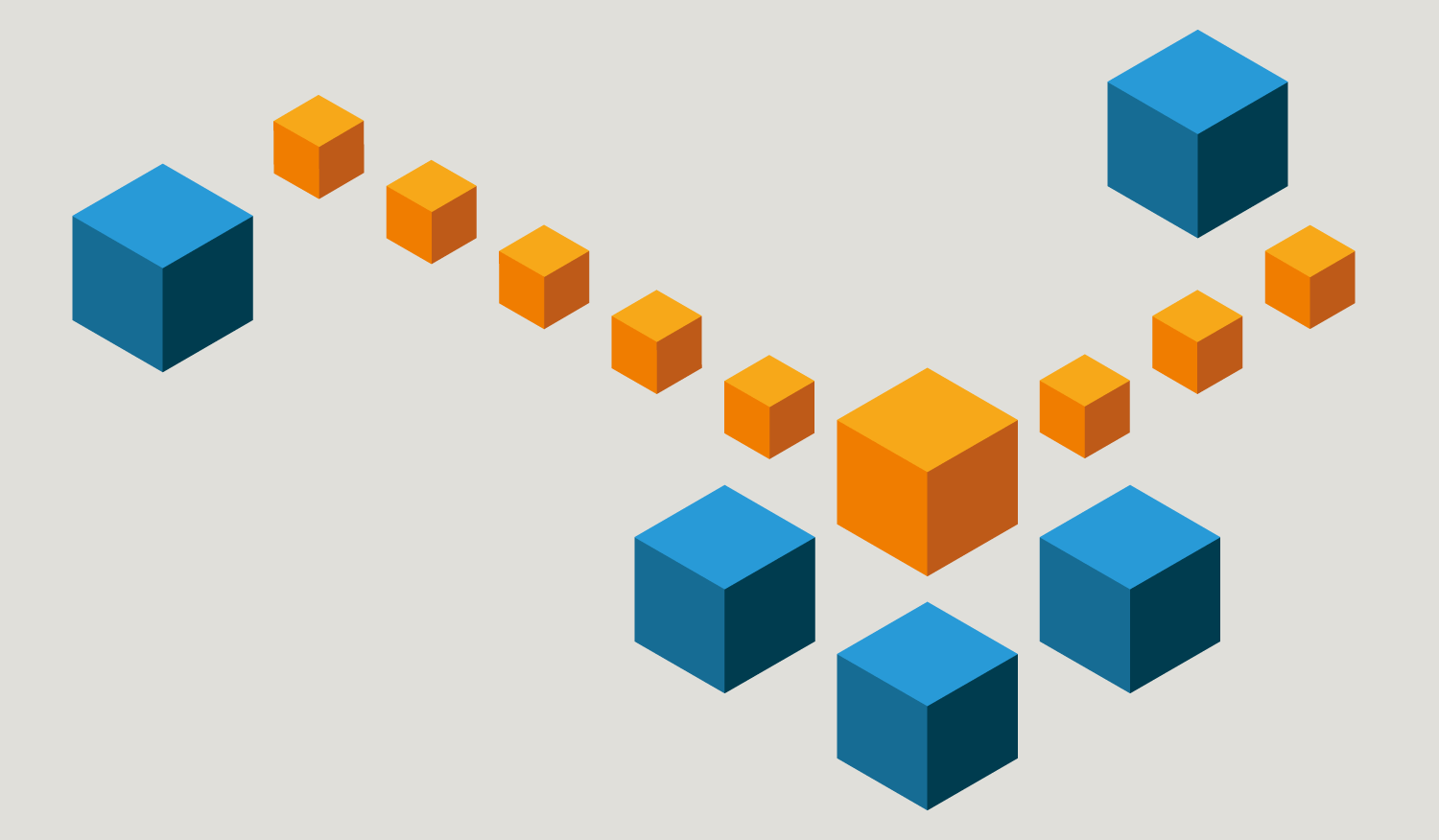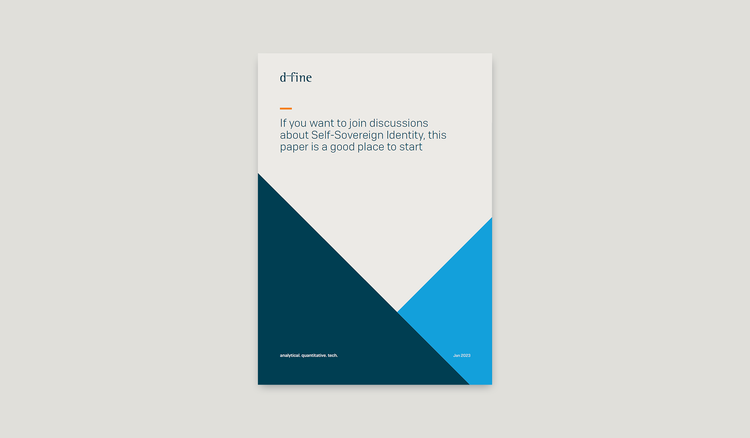- Our DNA
- Expertise
Our industry expertise
d-fine has the experts with the relevant project experience from your industry. Find out more about our services for your industry:
- Banking & Capital MarketsFintechs & Neobanks, Exchanges & Clearing Houses, Supervisory Authorities & Central Banks, Industry Associations & Service Providers
- Insurance & Asset ManagementProperty & Casualty Insurance, Life & Health Insurance, Re-Insurance, Capital Management Companies, Asset Management, Pension Funds
- Energy & IndustrialsEnergy, Chemicals, Industrials, Utilities, Construction, Logistics
- HealthcareLife Sciences, Pharma, Distribution, Medtech, Care
- Consumer & ServicesConsumer Products, Retail, Mobility, Real Estate Operations, Transportation, Automotive, Sports
- TechnologyTelecom, Media, Infrastructure, Software
- Public SectorGovernment, Agencies & Regulators, Research, Public Health, Public Companies, Public Transport, NGOs & Non-Profits
- Insights
- Career
- Locations

Blockchain & Digital Assets
We support the development of blockchain-based decentralized ecosystems and business models
Since 2016, we have successfully assisted our clients in the design and implementation of blockchain and digital asset-related topics in over 50 projects.
The topic of blockchain, or rather Distributed Ledger Technology (DLT), is strongly represented in the media due to the rise of cryptocurrencies, however DLT is more than simply the technical foundation for Bitcoin. The technology enables more efficient services which are accessible through a potentially global infrastructure. While disintermediation challenges existing roles, there are opportunities for developing new business models and differentiating products and services. Innovations in the field of Decentralized Finance (DeFi) offer new possibilities, as well as risks, including the splitting of financial services into their respective components.
Statement
Dr. Matthias Hirtschulz, Partner d-fine
» Topics in the area of blockchain and digital assets have varying degrees of maturity, with some feasible applications and opportunities already existing today. Important know-how should therefore be established today to enable business to be both reliable and competitive in the long term. «
Use Cases
Central Bank Digital Currency (CBDC) & Payments

Central bank digital currency (CBDC) plays an important role in payment transactions, but for most market participants, it is only available in physical form. While a digital variant can address the growing needs of all market participants in terms of secure electronic payments, it must not jeopardize the business models of financial institutions.
Decentralized Finance (DeFi)

Decentralized Finance (DeFi) encompasses new financial applications based upon technology in the form of decentralized applications (smart contracts) instead of relying on the activities of central entities such as banks, brokers, or asset managers. These can represent simple payments but also more complex applications such as loans, insurance, trading, etc.
Crypto Custody

The core of digital asset custody is the secure storage and operationalization of cryptographic keys that are used to control assets. In addition to the technical challenges, IT security and regulatory aspects must be considered during implementation.
Supply Chains & Internet of Things (IoT)

Lack of transparency at product level, high operational costs due to manual processes and excessive numbers of intermediaries constitute the core challenges of current supply chains. Blockchain technology in combination with IoT allows seamless traceability of products, the digitization of processes between suppliers and the reduction of intermediaries.
Non-Fungible Tokens (NFTs)

A Non-Fungible Token (NFT) is a digital asset with individual properties whose authenticity is cryptographically secured. Unlike well-known crypto assets such as Bitcoin, individual NFTs are not interchangeable. They can represent, for example, art objects, collectors' items, domains, or identities.
Tokenization

Tokenization is the process of creating a digital representative (token) of a (real) asset on DLT-based infrastructure. For this purpose, d-fine has created a tokenization platform that meets all our customers’ requirements, including smart contracts, KYC and much more.
Pay-per-X

During the course of digitalization, Pay-Per-X business models, such as usage-based financing and insurance products for production machinery are being increasingly developed. A combination of blockchain and industrial IoT technology allows the orchestration of usage data and payment flows within an ecosystem using smart contracts.
Self-Sovereign Identity (SSI)

SSI addresses the extensive reliance on third-party authentication, both physical and digital. Cryptographically verifiable proofs of identity are issued to subjects (holders) who decide for themselves which data they share with whom and at what time. The credentials are linked to decentralized identifiers (DIDs).
Our hands-on approach
With our hands-on approach, we offer you a fast and custom-fit solution based on your situation. We support you from strategy, through the development of a concrete business model, proof of concept (POC) and target operating models (TOM), to the technical implementation of a productive solution (MVP) and beyond.
We understand the high security requirements of financial service providers and are well versed on regulatory challenges. For this purpose, we implement modern and scalable infrastructures in the cloud or on-premises, all the while being cognizant of the rapid development in blockchain and digital assets and the need for resilient and sustainable processes in software development.
Together we can turn your vision into reality in no time!
Project examples
Self-Sovereign Identity (SSI)
Development of a platform for COVID-19 vaccination certificates
Due to regulatory, political as well as economic factors, the "Self-Sovereign Identity" framework has become increasingly important compared to traditional identification solutions. To obtain a valid assessment of the approach's significance for a company's product portfolio, d-fine supported the development of a prototype that issues and verifies vaccination cards as "Verifiable Credentials".
In addition to the choice of provider, the creation of suitable architecture and the development of web apps for the roles of issuers and recipients of such certificates, d-fine created target operating and business models.
The relevant basics of SSI and the applied blockchain technology were delivered to the customer in several training sessions. In addition, the prototype was handed over, together with operational and further development training.
Media Library
25.11.2021
Self-Sovereign Identities in Productive Systems – A Reality Check
20.10.2021
Digital Assets for Banks and Asset Managers
21.07.2021
Limits of SSI in Real-World Applications – and How to Overcome Them
21.07.2021
Challenges to Build an Infrastructure for Digital Securities
10.07.2021
Current Crypto Asset Based Business Models: From Custody to Crypto Funds
08.12.2020
Enabling Pay-Per-Use Models with Blockchain
08.12.2020
The Role of Financial Intermediaries in Digital Asset Infrastructures
19.10.2020
Real Estate Investments for Everyone: Approach, Challenges, and Prospects
13.07.2018
From Custody to Trading - Regulated Digital Asset Infrastructure in Germany






![[Translate to English:] [Translate to English:]](/fileadmin/_processed_/4/8/csm_DvP_using_CBDC_Grafik_Cover_1_Website_152f76b6bb.png)



